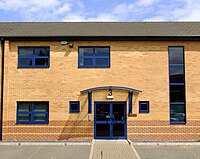Radio Society of Great Britain
 |
|

RSGB headquarters in Bedford, UK, July 2009.
|
|
| Abbreviation | RSGB |
|---|---|
| Formation | 1913 |
| Type | Limited company, registered in England and Wales |
| Purpose | Advocacy, Education |
| Headquarters |
3 Abbey Court, Fraser Road, Priory Business Park, Bedford MK44 3WH |
|
Region served
|
UK |
|
Membership
|
22,600 |
|
President
|
Nick Henwood G3RWF |
|
Main organ
|
board of directors |
| Affiliations | International Amateur Radio Union |
| Website | http://www.rsgb.org/ |
3 Abbey Court, Fraser Road, Priory Business Park, Bedford MK44 3WH
The Radio Society of Great Britain (RSGB), first founded in 1913 as the London Wireless Club, is the United Kingdom's recognised national society for amateur radio operators. The society's patron is Prince Philip, Duke of Edinburgh and it represents the interests of the UK's 60,000 licensed radio amateurs. A long recognised amateur radio organisation, the society is the national member society representing the United Kingdom and certain dependent territories of the United Kingdom in the International Amateur Radio Union. It also acts as a medium for communication between the licensed operators and the UK government.
The RSGB has traditionally acted as the organisation through which amateur radio enthusiasts interact with the telecommunications regulatory authority of the United Kingdom, Ofcom. Although Ofcom has recently used its web site to solicit opinions directly from interested parties, the RSGB continues to advise and to seek to influence Ofcom on the likely impact of proposed changes in many areas – from decisions on licensing and bandwidth controls through to the use of Broadband over Power Lines PLT (which it is thought would cause large amounts of electromagnetic noise).
RSGB also acts as a parent organisation to many smaller groups and societies. Some of these societies unite local areas (such as repeater groups) or groups of individuals (such as Forces service groups, or old timer groups) or even people interested in a particular amateur radio band (such as 2-metre band groups).
The society publishes a monthly magazine called RadCom, along with a range of technical books.
The roots of the Radio Society of Great Britain can traced back to the formation of the London Wireless Club, inaugurated in West Hampstead on 5 July 1913. At its first meeting in September of that year, it was decided that the name should change from the London Wireless Club to the Wireless Society of London. In November 1922, the name of the Society was changed to that it holds to this day, the substitution of the term 'Great Britain' for 'London' being made with the view to extend the perceived scope of the Society's work.
...
Wikipedia
